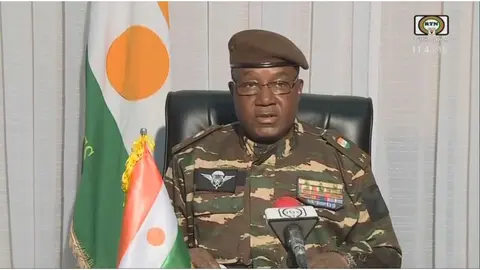Triple anti-French alliance in the Sahel

Niger, Burkina Faso and Mali have concluded a collective defence agreement in Bamako that effectively enshrines their break with the former colonial power and also openly confronts the Economic Community of West African States (ECOWAS). The triple alliance, signed on Saturday, copies almost verbatim article 5 of the NATO Treaty, stating that "any attack on the sovereignty and territorial integrity of one or more of the contracting parties shall be considered as an aggression against the other parties and shall entail a duty of assistance". This of course includes the use of armed force.
The signing of the treaty, known as the Liptako-Gourma Charter, takes its name from this region, the vertex on which the border areas of the three countries converge, and which is constantly experiencing crises caused by high levels of poverty, increasingly scarce resources and violence triggered by crime and organised crime, which has led to the displacement of 90% of its population, close to three million people, and a considerable increase in emigration to Europe, either by sea to the Canary Islands or in pursuit of the Mediterranean. The sharp increase in the arrival of migrants to the Spanish archipelago and the Italian island of Lampedusa are part of the thermometers that measure the rising tension in the Sahel.
The agreement also came as the French ambassador in Niamey, Sylvain Itté, was being held hostage in the embassy building, "kidnapped" in the words of President Emmanuel Macron, without his diplomatic colleagues from Spain and the EU being able to deliver food and other basic necessities to him. Nigerian coup plotters also incited tens of thousands of people to demonstrate in front of one of the French bases, demanding that it be vacated. Only 1,500 of France's 5,000 troops remain, along with dozens of combat aircraft and helicopters.
The move by the three coup juntas in Niger, Mali and Burkina Faso also comes in the wake of ECOWAS's alleged failure to make good on its threats to intervene militarily if the Nigerian coup leaders under General Abdoaurahmane Tchiani did not restore President Mohammed Bazoun to office. In early August, Nigeria, Côte d'Ivoire, Senegal and Guinea had led the warnings, giving a week's deadline to reinstate Bazoun. Neither did the coup plotters do so, nor did ECOWAS troops, whose chiefs of staff had allegedly coordinated to execute the operation, invade the country.
The main conclusion of all this is that France has definitively lost its footing in the region, where it faces a growing and manifest hostility, a mood that could extend to the European Union itself.
And, in connection with this, that Russia is most likely encouraging anti-Western sentiment in the region. Significantly, the announcement of the formation of the alliance followed a joint meeting of the defence ministers of Mali and Niger, but was also attended by Russian Deputy Defence Minister Yunus-Bek Evkurov, accompanied by General Andrei Averyanov, the latter suspected of having organised the sabotage of the plane carrying the Wagner Group's leadership, including its top leader Yevgeny Prigozhin.
Before going to Bamako, Evkurov had visited Burkina Faso to meet with the leader of its military junta, Ibrahim Traoré, with whom he reportedly discussed "military aid, cooperation in nuclear energy and economic ties". Regarding the first chapter, Russia is said to have promised to provide instructors to the Burkinabe army, including in the piloting of fighter jets.
Once again, it seems that we are on the road to another Russia-West confrontation with Africa as the hottest and bloodiest theatre. As much as the strongman of Mali's coup junta, Assimi Goita, tried to wrap the agreement in "a grand project of mutual assistance for the benefit of the respective populations", it seems clear that the military aspect of the alliance takes precedence.
For its part, if it fails to react, ECOWAS will lose much of its credibility. The constant diplomatic twists and turns and procrastination have rendered its threat capacity null and void, instigated mainly by Niger's President Bola Tinubu, who had even proposed a nine-month transition period to Niger's coup plotters, which they have flatly rejected, demanding no less than three years before elections can be held again.
Meanwhile, jihadist terrorism is also gradually increasing its operations of occupation and terror in parts of the Sahel, taking advantage of the evidence of the failed state that Libya has become, as evidenced by the tragedy caused by Hurricane Daniel. Daesh offshoots have established themselves in the country, which could in turn serve as a base for launching major terrorist attacks.



